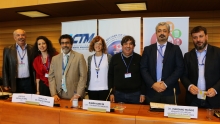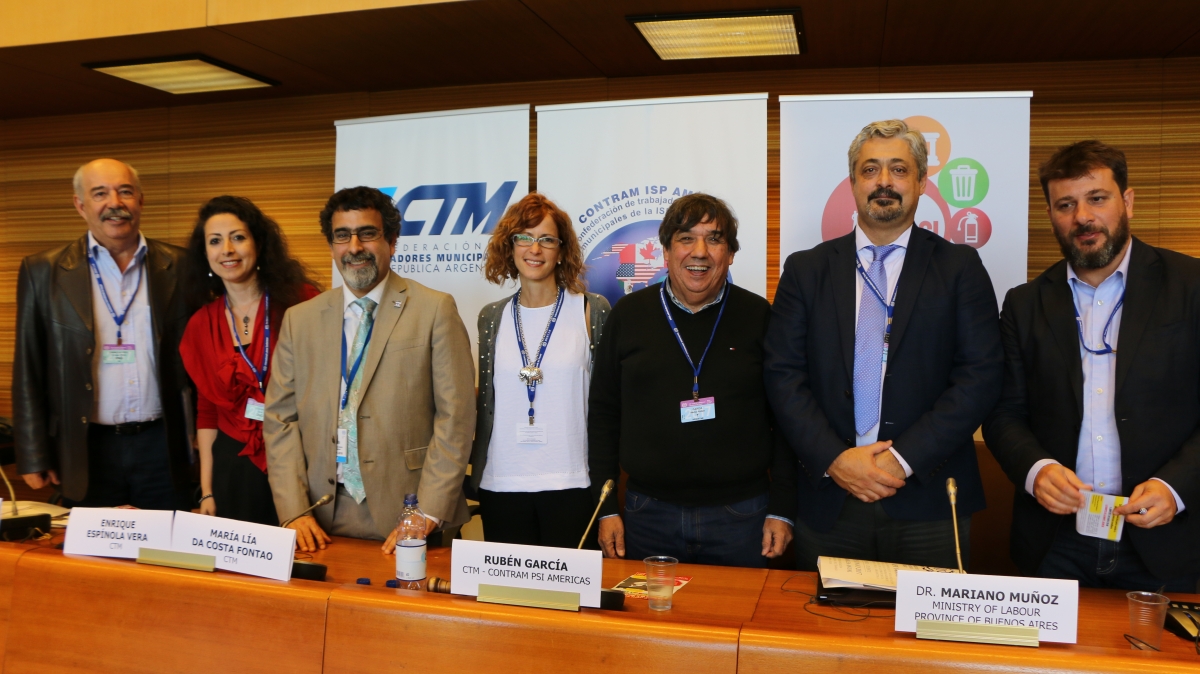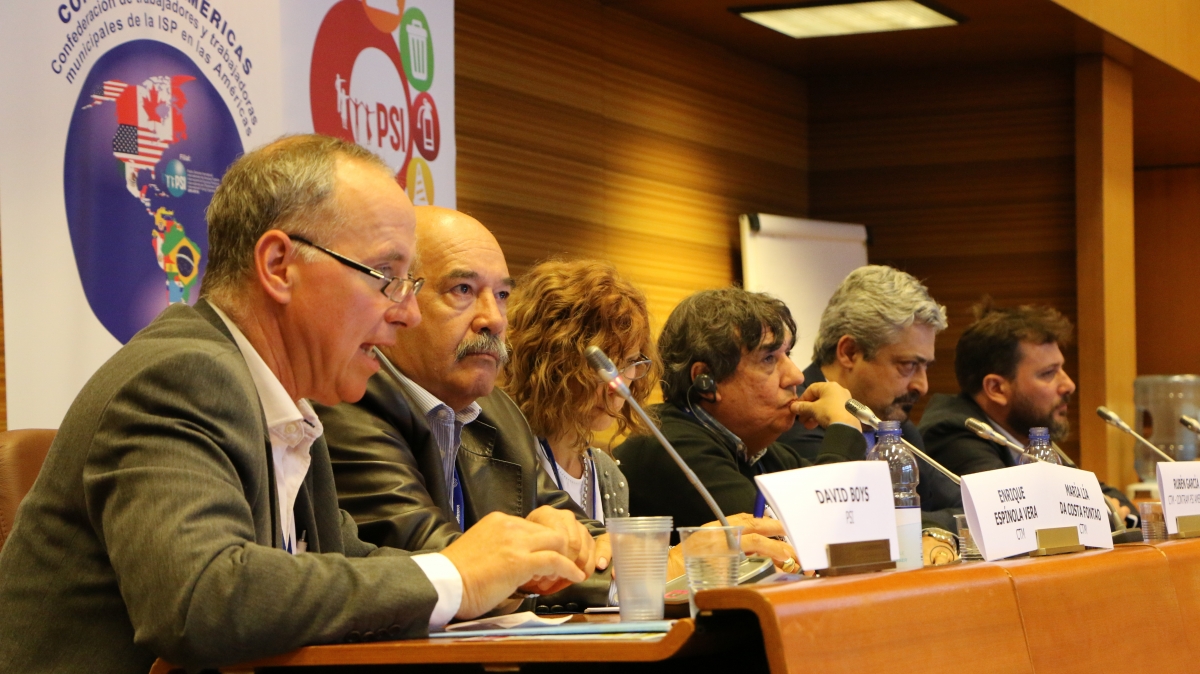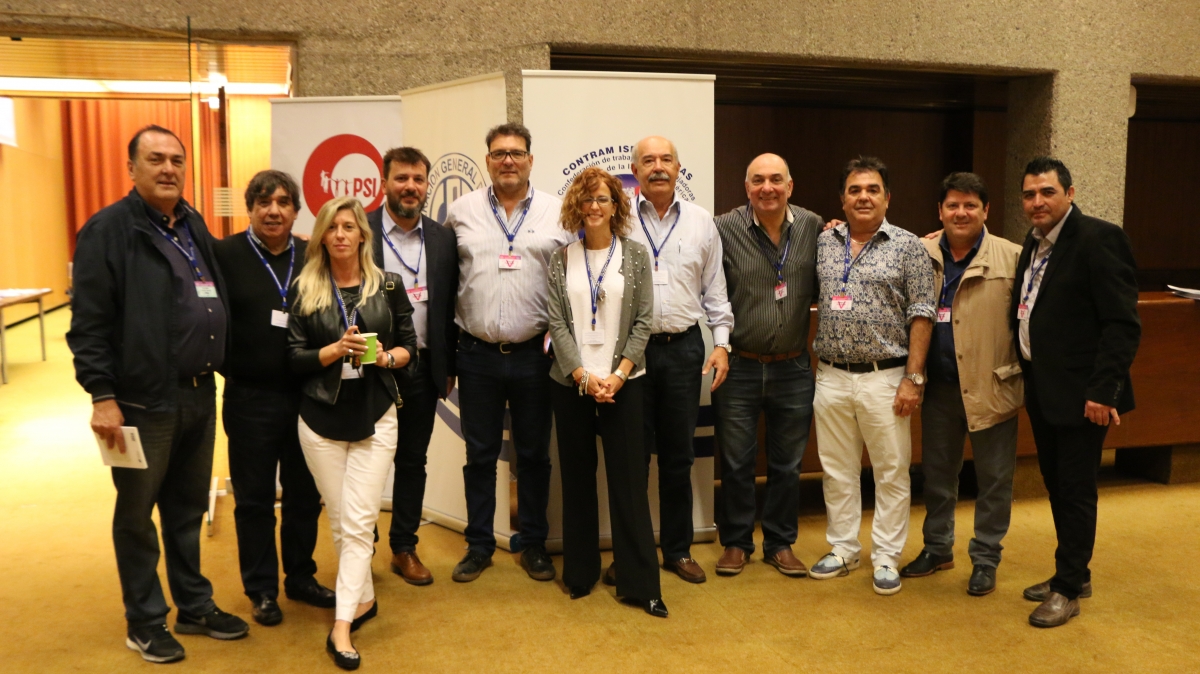CTM and PSI take municipal workers’ union rights to the fore at the International Labour Conference 2017

On 6 June 2017, in a public debate held during the International Labour Conference (ILC) at the International Labour Organization (ILO), a delegation from PSI Argentinean affiliate the Municipal Workers’ Confederation (CTM) shared the struggle that led to Act 14656 on Labour Relations and Collective Bargaining in the Province of Buenos Aires (“Paritarias Act”) and the challenges that remain to uphold it with over 60 ILC delegates from Latin America, Africa, Asia, Europe and Arab countries.
Adopted in 2015, the Paritarias Act radically changed the previous system of municipal labour relations in the Province of Buenos Aires. From a unilateral system set by mayors in absence of social dialogue, the Act now mandates collective bargaining with municipal workers’ unions in the 135 municipalities of the Province, requiring local authorities to negotiate with trade unions on working conditions and pay for municipal workers. This is a critical win for the municipal public sector trade union movement of Argentina and of the world. It shows how developing a legal instrument and getting it voted through local labour MPs while, at the same time, rallying workers around the goal of getting the law into force can be a winning trade union strategy.
Jointly organized by the CTM, including CONTRAM-PSI[1], and by PSI, the public debate featured the presence of Hernan Doval, Deputy of the Province of Buenos Aires and author of Act 14.656; Mariano Muñoz, Undersecretary of Labour for the Province of Buenos Aires; Carlos Carrion-Crespo, ILO Specialist for the Public Sector and Utilities; Ruben García, CTM and CONTRAM-PSI General Secretary; and David Boys, PSI Deputy General Secretary.
This event challenged the public sector’s image as a monolithic, mostly central government institution. It showed that when it comes to providing services to local communities, fostering inclusive local economic development and upholding the global policy frameworks such as the SDGs, the Decent Work Agenda, COP 21, or the New Urban Agenda, it is municipal workers who ultimately get the job done. Yet these workers often have no collective bargaining rights and lack the working conditions they need to properly deliver quality local public services.
 |
|---|
|
Photo: from the left Dr. Enrique Espínola Vera (CTM), Daria Cibrario (PSI), Carlos Carrion-Crespo (ILO), Maria Lía Da Costa Fontão (CTM Advisor), Ruben Garcia (CTM/CONTRAM-PSI General Secretary), Dr. Mariano Muñoz (Ministry of Labour, Province of Buenos Aires), Hernan Doval (Province of Buenos Aires/CTM-STMA). |
 |
|---|
In his introduction to the panel, David Boys, PSI Deputy General Secretary, said:
“All major global policy decisions are taken by national governments. Yet it is the local and regional governments that will have to implement them, in spite of the fact that they weren’t involved in decision making. Local and regional governments are not duly represented in global institutions, including the ILO. PSI is working to make sure that the voice of municipal workers and their trade unions is heard and that their role is duly acknowledged.”
Daria Cibrario, Policy Officer for the Local and Regional Government Sector at PSI, said:
“It is crucial to raise awareness among public opinion, citizens, service users, among government officials and elected representatives, and within the UN that for local and regional government workers, the full enjoyment of freedom of association and collective bargaining is not only a basic human right they are entitled to, but also a necessary precondition to enable them to do their job properly and to adequately serve their communities delivering quality public services.”
 |
|---|
|
Photo: The CTM delegation at the ILC2017 |
Hernan Doval, author of the Act and Deputy of the Province of Buenos Aires, recalled:
“Before this act, the employment conditions of municipal workers were totally precarious. Mayors and local authorities had feudal-like powers over them and could unilaterally determine wage levels, promotions and dismissals, disciplinary acts and labour relations by unilateral decree, which was totally undemocratic.”
During the 1990s, the denial of municipal workers’ labour rights facilitated the implementation of the neoliberal agenda in Argentina.
“Mayors could use municipal jobs as a bargaining chip for their political deals, damaging the profession, favouring corruption and jeopardizing the quality of local public services. The Paritarias Act has turned this situation upside down. It did away with the absolute power of mayors over the lives and the labour relations of municipal workers. By creating worker stability and a clear procedure for the dismissal and transfers that could be used to punish workers, it put a halt to arbitrary procedures,” explained Doval.
The Act put an end to the common practice of maintaining a high numbers of casual workers in municipal services, setting a cap to a maximum of 20% with a clear understanding that such labour is hired to perform extraordinary and time-bound – not ordinary – work. It fixed a minimum living wage for municipal workers who, until the act came into place, were the only category not covered by minimum wage provisions in the Province.
“Ultimately, this Act meant a power transfer from mayors to municipal workers and their trade unions, as it broke unilateralism in labour relations and established a more symmetric, democratic relationship. The law has empowered them to become active actors of their own labour relations, it has given back to them their voice and the opportunity to build their labour relations on legally enforceable collective agreements,” he added.
There has been a lot of resistance to the law, which continues its implementation process. A year and a half after the law has come into force, 47 collective agreements have been signed out of 135 municipalities in the Province of Buenos Aires where the law is in force.
“Each and every one of them carries the mark of that local power struggle” Doval concluded.
Hernan Doval authored two books on the Paritarias Act: “14.656 (The Act)” and “Of Labour Terror. Coercive practices, clientelism and violations of human rights in local public employment. The case of the Municipality of Avellaneda (2014-2016)”.
Representing the Ministry of Labour of the Province of Buenos Aires, Dr. Mariano Muñoz said:
“We are the responsible institution in the public administration to ensure the implementation of this Act. We are walking down this path and facilitating this process: in doing so we have to manage the anxiety of many. (…) Collective bargaining is one of the most important creatures of labour relations: it is through collective bargaining that labour rights are established and can be enjoyed. We wish to win this space of labour relations. Our common objective and aspiration is to have 135 collective agreements signed and in force in the Province of Buenos Aires. We need to work together to build this capacity and get the message across about the value that collective bargaining and agreements at a municipal level bring.”
CTM’s Dr. Enrique Espínola Vera explained the daily reality of municipal workers in those municipalities where the Act has not yet been implemented and collective agreements have not yet been negotiated:
“Municipal workers living under precarious conditions are afraid of becoming unable to fund their loans because of the precarious nature of their employment. In some of the municipalities there are up to 80 or 90 percent of precarious workers who carry out regular work. Now with the Act, precarious municipal workers have won compensation in case of lack of renewal and a clear definition of the kind of work that can be carried out by temporary workers, that is only work of an extraordinary, time-bound nature. Under the new Act, if these rules are broken, the temporary worker is immediately requalified as permanent.”
He explained the importance of the right to information set out by the Act:
“The Act sets the critical obligation to secure access to information that enables workers and their unions to know the finances of the municipality and their cost breakdown and to use it in the collective bargaining process. In the majority of the municipalities of the Province, it is still impossible to know how many municipal workers are employed, under which conditions and their gender breakdown. The obligation of information is crucial to democratize municipal employment labour relations, to restore the professionalization of the category and to end the distribution of municipal jobs for political clientelism.”
Maria Lía Da Costa Fontão, CTM Adviser, highlighted the innovative provisions introduced by the Act, which extends coverage and protection for diversity and non-discrimination in the recruitment of municipal workers, including gender, religion and ethnic origin.
“It extends and turns ‘maternity leave’ into ‘parental leave’, which applies to both parents – mother and father - in an interchangeable way, and applies in case of adoption, too. It provides a 20-day leave per year for in-vitro fertilisation treatment, as a means to guarantee the human right to procreate; as well as leave facilities in case of gender-based violence for both women and men. Finally, it introduces health screening paid leave for cancer prevention and parental care in the case of children with different abilities,” she said.
Finally, Ruben García, CTM General Secretary, said:
“This Act was a win because it was not only achieved through technical means, but through workers’ mobilization. It was won the hard way, with a 17-year long struggle. Whenever we wanted to initiate dialogue, in many cases the mayors would refuse to even talk with us. Traditionally, in many parts of the province, the mayors were called ‘the barons’. We decided, as a municipal workers’ union, that we had to put a limit to their absolute power over the most important resources municipalities have: their workers. (…)This Act gave municipal workers a different vision than one of fear and submission, a clear joint objective to rally and fight for together, to reclaim their voice. It made it possible for them to change their status from ‘servants’ - property of the municipality - to ‘service workers’. Every time we mobilized we were repressed. But every time they repressed us, more workers would join our movement and we would mobilize again. We as trade unions promoted the Act. But it was the municipal workers who defended it in the streets,” he concluded.
In the concluding remarks, Carlos Carrion-Crespo, Specialist for the Public Sector and Utilities at the ILO, said:
“The issue of trade union rights of municipal workers has not been discussed as much in the ILO as we would have liked. Until a few years ago, in many countries where public sector rights and collective bargaining had advanced considerably, the situation of municipal workers remained behind, as if they were the ‘forgotten children’ of the public sector. In this sense, the adoption of this Act represents an important achievement for the trade union movement.”
He added,
“The culture in municipal government is very different from the one in regional and central government. Traditionally local governments don’t see themselves as employers but have a paternalistic approach, and when workers join a union this can be as a lack of loyalty by the government. The political power that municipal policy leaders have can be very strong at a national level. Collective bargaining at a municipal level is more common in large cities like Sao Paulo, Mexico City and now Buenos Aires. But the municipal workers of small municipalities too are entitled to rights, protection and a voice at work.” The ILO has recently documented a number of good practices in collective bargaining at a municipal level in its publication “Promoting constructive approaches to labour relations in the public service. Examples from collective agreements”.
Documents for download:
- Hernan Doval, “14.656 (The Act)” (in Spanish)
- Hernan Doval, “Of Labour Terror. Coercive practices, clientelism and violations of human rights in local public employment. The case of the Municipality of Avellaneda (2014-2016)” (in Spanish)
- ILO “Promoting constructive approaches to labour relations in the public service. Examples from collective agreements”
- Photos on PSI Facebook page - @PSIGlobalUnion

